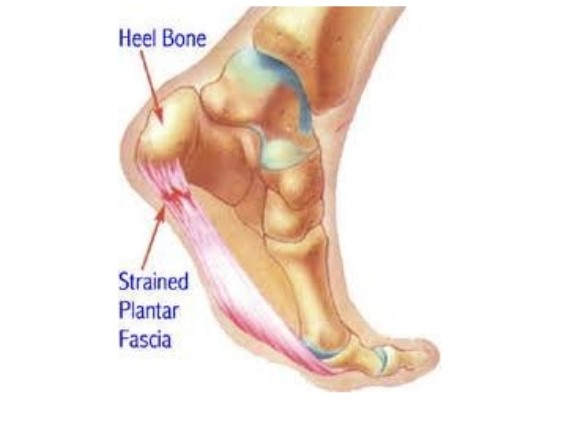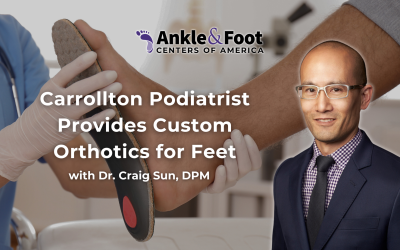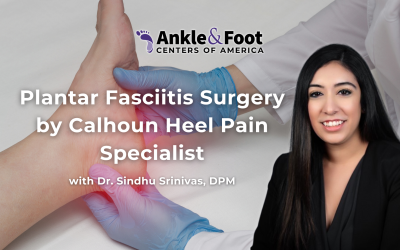Table of Contents
What is Plantar Fasciitis?
Heel pain is a very common problem we see at our Snellville, GA location and a common issue for all foot and ankle doctors. The good news is that many successful treatments are available to treat this pain conservatively. A common cause of heel discomfort is Plantar Fasciitis. Typically, pain will occur in the bottom of the heel during the first few steps of the day, or after sitting for an extended amount of time. The pain can worsen with prolonged standing and activity.
What is the Plantar Fascia and how is it related to heel pain?
The plantar fascia is a ligament that connects your heel bone (calcaneus) to the ball of your foot and helps support your arch. Over time the heel insertion of the plantar fascia becomes irritated and inflamed. Common causes are tight calf muscles, obesity, a very high/low arch, increased/new activity, repetitive impact, or worn-out shoe gear. This is Plantar Fasciitis. Also, a formation of a heel spur could occur; this is a reaction of plantar fascia tension and is not necessarily the cause of pain.
What is the treatment?
Conservative care is very successful in treating plantar fasciitis, but severe cases may require surgery. Conservative (non-surgical) options are stretching, icing, anti-inflammatory medications, supportive shoes and arch supports, injections, physical therapy, a night splint, or walking boot or casting. Your foot and ankle doctor should only recommend surgery if conservative care has failed to provide the necessary relief. Extracorporeal shockwave therapy (ESWT) is a non-invasive procedure that does not require any surgical incision, and involves high-energy shockwave impulses to help stimulate the healing process. Invasive procedures for Plantar Fasciitis include a gastrocnemius recession (lengthening of the calf muscles), partial plantar fascia release, or removal of the bone spur. The goal of the gastrocnemius recession is to lengthen the contracted musculature (when stretching hasn’t worked) in the calf region to decrease tension to the heel. A plantar fascia release is performed when ankle joint range of motion is normal. This will directly release tension of the plantar fascia. It is very rare that the bone spur needs to be removed, and is only performed when the spur is extremely enlarged.
Are there different types of heel pain?
A condition known as Sever’s disease or calcaneal apophysitis causes heel pain in pediatric patients. This commonly occurs in children who are physically active, and during their growth spurt. The most common cause is being too active and not allowing enough rest time for recovery. Treatment includes stretching exercises, limiting physical activity, wearing supportive shoes and arch supports, icing, anti-inflammatory medications, and physical therapy.
Heel discomfort also can involve the back of the heel at the Achilles tendon insertion. In Achilles tendonitis, the tendon becomes inflamed from an increase in activity, improper shoe gear, uphill running, or calf muscle tightness. When treated early, the condition is often relieved quickly. Treatment includes heel lifts, stretching exercises, activity modification, anti-inflammatories, icing, shoe gear modifications, and possible walking boot or casting.
Achilles tendinopathy is a chronic condition that results from the degeneration and micro-tearing of the Achilles tendon and often occurs in middle-aged athletes. Causes include tight calf muscles, decreased blood supply to the tendon, obesity, increased strain of the tendon due to foot type, improper shoe gear, poor training, and prior injuries. Conservative treatment consists of supportive shoes, arch supports, activity modifications, heat therapy, physical therapy, and stretching exercises. Severe cases may require surgery. The purpose of surgery is to remove the degenerative parts of the tendon and to stimulate the healing process. It is common for full surgical recovery to take 6 months or longer.
A retrocalcaneal exostosis is the prominent heel bone (calcaneus) formation at the back of the heel. High heels or the shoe back can cause irritation and pain with this condition. This condition can be associated with a tight Achilles tendon, inflammation of the Achilles tendon, or swelling of specialized fluid sacs around the Achilles insertion to the calcaneus. Treatment is very similar to that of Achilles tendonitis, however, if conservative care fails you should consider surgery. The Achilles tendon will be partially reflected from its insertion into the heel bone. The foot and ankle specialist will then smooth and contour the prominent bone, and will reattach the Achilles tendon to the calcaneus using sutures or bone anchors. Full recovery can take 6 months or longer after surgery.
Other possible causes of pain in the heel include nerve compression, systemic arthritis, bone tumors, and fractures. A Podiatrist will perform a thorough clinical exam and take x-rays to determine the cause of the pain. During your visit to the office, reasons for pain will be discussed, and the best treatment plan will be established.






